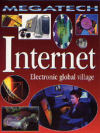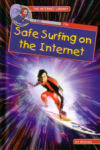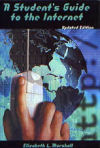Internet Generation Additional Information
For information on how the Internet works, go to computer.howstuffworks.com/internet-infrastructure.htm (How Stuff Works), www.tinhat.com/internet_basics/how_the_internet_works.html (TinHat), www.internet101.org/ (Scott Cottingham), and www.exn.ca/Nerds/internet.cfm (Discovery Channel Canada).
To find out more about research on children and the Internet, go to www.apa.org/releases/youthwww0406.html (American Psychological Association).
You can learn more about the Children’s Internet Protection Act at www.fcc.gov/cgb/consumerfacts/cipa.html (Federal Communications Commission).
Information about the Junior Summit can be found at web.mit.edu/newsoffice/1998/summit-1125.html and web.mit.edu/newsoffice/1998/summit-0916.html (Massachusetts Institute of Technology).
The Children’s Digital Media Center at the University of California, Los Angeles has a Web site at www.cdmc.ucla.edu/(UCLA).
Sohn, Emily. 2006. Programming with Alice. Science News for Kids (Feb. 22). Available at http://www.sciencenewsforkids.org/2006/02/programming-with-alice-3/.
______. 2005. The disappearing newspaper. Science News for Kids (Oct. 5). Available
at http://www.sciencenewsforkids.org/2005/09/the-disappearing-newspaper-2/.
______. 2005. An ancient childhood. Science News for Kids (May 25). Available at http://www.sciencenewsforkids.org/2005/05/an-ancient-childhood-2/.
______. 2005. The snappy lingo of instant messages. Science News for Kids (March 30). Available at http://www.sciencenewsforkids.org/2005/03/the-snappy-lingo-of-instant-messages-2/.
______. 2004. What video games can teach us. Science News for Kids (Jan. 21).
Available at http://www.sciencenewsforkids.org/2004/01/what-video-games-can-teach-us-2/.
______. 2004. The violent side of video games. Science News for Kids (Jan. 14).
Available at http://www.sciencenewsforkids.org/2004/01/the-violent-side-of-video-games-2/.
Books recommended by SearchIt!Science:
 |
Internet: Electronic Global Village — David Jefferis
Published by Crabtree Publishing, 2002.
Discover how the dawn of the Internet will affect our future. Question-and-answer boxes and numerous colorful photographs pepper the book’s double-page spreads, which explore topics ranging from Web browsers to computer security. The prospects of new technologies such as e-fridges, future weaponry, and digital cameras are touched upon in this wide-ranging discussion of what a wired world might be like. |
 |
Safe Surfing on the Internet— Art Wolinsky
Published by Enslow Publishers, 2003.
Why should we have rules about how to use the Internet? The first chapter in this book concerns why we need rules. It explains that rules change over time and discusses how new rules develop with new technology—which is where the Internet comes in. This book, designed to help you become a good “netizen,” explains the difference between laws, netiquette, and rules set by your school. It discusses the Children’s Online Privacy and Protection Act as well as the Children’s Internet Protection Act, the Acceptable Use Policies (AUPs) that schools set up, and why AUPs are needed and what is in them. Inappropriate or adult sites, e-mail use and abuse, privacy issues, bandwidth issues, plagiarism, and software piracy are discussed in this comprehensive, readable book. |
 |
A Student’s Guide to the Internet — Elizabeth L. Marshall
Published by Twenty-First Century Books/Millbrook Press, 2001.
Discover the exciting ways in which people and computers can communicate and exchange information. The World Wide Web and the Internet have become an important way for people all over the world to communicate with each other. Learn about e-mail, searches, mail lists, discussion groups, and more! Get tips for using the Internet to find quality sources for research papers. Explore ideas for Internet safety and Internet etiquette. |
Power Words
Internet The network that connects computers around the world. People all over the world are able to send and receive information over the Internet because of a special set of rules that control the way that information travels.
psychology The scientific study of the mind, feelings, and behavior.
Copyright © 2002, 2003 Houghton-Mifflin Company. All rights reserved. Used with permission.
